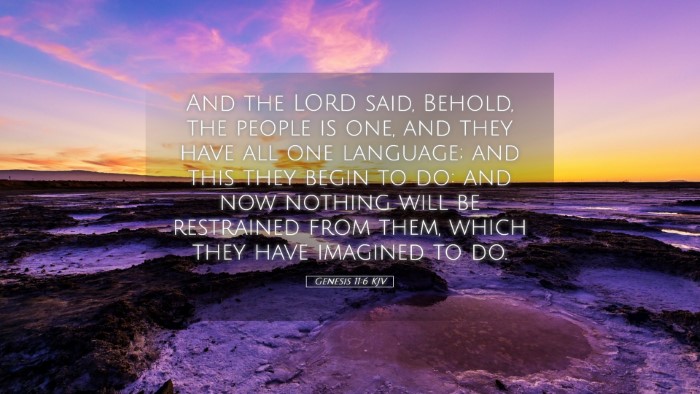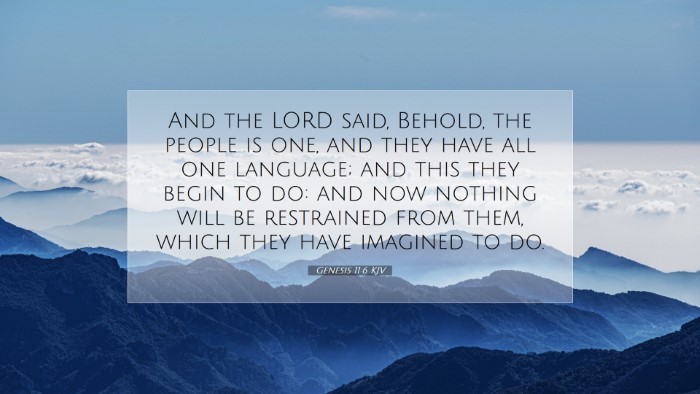Commentary on Genesis 11:6
Genesis 11:6 states: "And the Lord said, Behold, the people is one, and they have all one language; and this they begin to do: and now nothing will be restrained from them, which they have imagined to do."
Introduction
This verse is pivotal in understanding the biblical narrative of human unity and ambition. It comes from the account of the Tower of Babel, where humanity, united by a single language, attempts to build a tower to the heavens. This event raises profound theological and sociological reflections regarding the nature of humanity, divine intervention, and the limits of human ambition.
Thematic Insights
The Nature of Human Unity
Matthew Henry notes that this verse highlights a remarkable aspect of humanity — the power of unity. He argues that when people are united and share a common purpose, they can achieve significant feats. This principle is observable both in the context of the Babel account and in contemporary society. However, Henry warns that this unity’s potential can lead to endeavors that defy God’s will.
The Power of Language
Albert Barnes emphasizes the critical role of language in human communication and collaboration. He suggests that the shared language played a vital role in enabling the people to conceive and attempt grand projects. Language is not merely a tool for communication; it is the vehicle for shared ideas and dreams, illustrating the intellectual and cultural capacities of humanity as they endeavor toward greatness.
Divine Observation and Intervention
In this passage, God observes the unity and ambition of mankind and recognizes the potential dangers in their aspirations. Adam Clarke elaborates that God’s statement reflects His omniscience, understanding the implications of human endeavors. Clarke posits that God does not intervene in human affairs lightly; rather, He perceives the necessity of action when humanity’s designs contradict divine order.
Theological Reflections
The Limits of Human Ambition
Genesis 11:6 serves as a reminder of the limitations placed upon human ambition by divine authority. Matthew Henry articulates this beautifully when he observes that while humans can envision and create, these efforts must align with divine intention. This assertion leads to essential questions for theologians: What happens when human aspirations exceed God’s ordained boundaries? What mechanisms does God employ to redirect humanity’s focus?
Humanity's Default to Self-Sufficiency
This passage reveals a tendency within humanity to rely on collective achievements, possibly leading to arrogance and self-sufficiency. Albert Barnes argues that the pursuit of such grand designs, while impressive, reflects an underlying rebellion against God. The desire to build a tower that reaches heaven symbolizes humanity's ambition to achieve status and glory independently of God.
God’s Sovereignty and Control
Furthermore, the verse emphasizes God’s sovereignty over human affairs. Adam Clarke highlights that God’s statement regarding the peoples' potential serves as both affirmation and caution. It reveals that while humanity can attain great things, it remains bound by God’s ultimate authority. God’s intervention, therefore, is not merely punitive but corrective, aimed at realigning humanity’s trajectory with His divine will.
Practical Applications
Unity in Purpose
For Pastors: This text serves as an exhortation for churches and congregations to strive for unity of purpose. When a community joins together under a common goal, they can enact significant change. However, leaders must ensure that such unity is rooted in the pursuit of God’s kingdom and His righteousness.
Critical Examination of Ambition
For Students and Scholars: Genesis 11:6 invites critical examination of our ambitions. In what ways are our personal and collective goals aligned with divine principles? It beckons us to inquire whether our pursuits are genuinely aimed at glorifying God, or whether they reflect human pride and self-centeredness.
The Centrality of God's Will
For Theologians: The implications of God’s response to humanity’s unity prompt deeper theological reflection on divine sovereignty. It illustrates the importance of aligning all human endeavors with God’s will and challenges scholars to explore the tension between human freedom and divine oversight.
Conclusion
Genesis 11:6 encapsulates a rich narrative of human ambition, divine observation, and the imperative of recognizing our place within God’s creation. As we reflect on this passage, we are reminded of the potential for greatness that exists when humanity collaborates, yet also of the crucial need for submission to God’s greater plan. In our endeavors — both individually and collectively — may we remain attuned to God’s guidance, so that our unity leads not to rebellion but to the fulfillment of His divine purpose.


